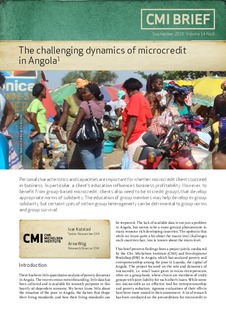| dc.contributor.author | Kolstad, Ivar | |
| dc.contributor.author | Wiig, Arne | |
| dc.date.accessioned | 2018-01-04T08:20:01Z | |
| dc.date.available | 2018-01-04T08:20:01Z | |
| dc.date.issued | 2015-09-18 | |
| dc.identifier | oai:www.cmi.no:5628 | |
| dc.identifier.citation | Bergen: Chr. Michelsen Institute (CMI Brief vol. 14 no. 6) 4 p. | |
| dc.identifier.issn | 0809-6732 | |
| dc.identifier.uri | http://hdl.handle.net/11250/2475061 | |
| dc.description.abstract | Personal characteristics and capacities are important for whether microcredit clients succeed in business. In particular, a client’s education influences business profitability. However, to benefit from group-based microcredit, clients also need to be in credit groups that develop appropriate norms of solidarity. The education of group members may help develop in-group solidarity, but certain types of within-group heterogeneity can be detrimental to group norms and group survival. | |
| dc.language.iso | eng | |
| dc.publisher | Chr. Michelsen Institute | |
| dc.relation | CMI Brief | |
| dc.relation | 6 | |
| dc.relation.ispartof | CMI Brief | |
| dc.relation.ispartofseries | CMI Brief vol. 14 no. 6 | |
| dc.relation.uri | https://www.cmi.no/publications/5628-the-challenging-dynamics-of-microcredit-in-angola | |
| dc.subject | Microcredit | |
| dc.subject | Education | |
| dc.subject | Business | |
| dc.subject | Angola | |
| dc.title | The challenging dynamics of microcredit in Angola | |
| dc.type | Report | |
